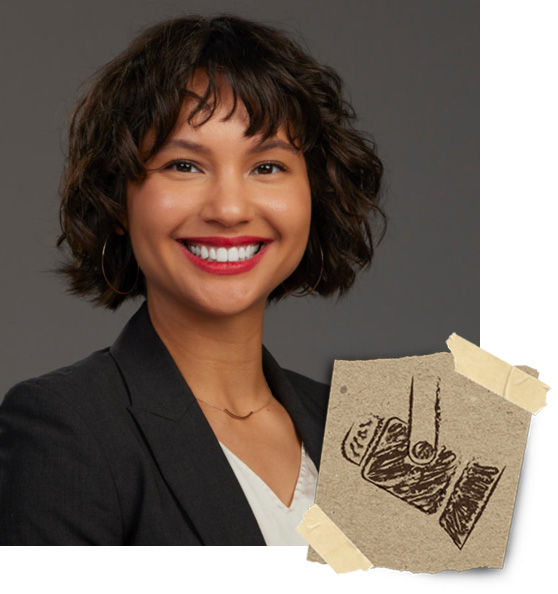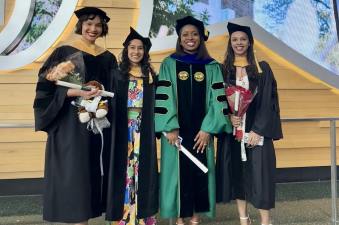Access Spotlight: Dr. Lauren Wiklund
October 22, 2024 - Emily Jodway
 Lauren Wiklund is our Access Spotlight for the month of October, as we celebrate LGBT History Month. Wiklund earned her PhD this past spring (‘24) from the MSU Department of Psychology Clinical Science program, where her dissertation and research centered around the sexual health and wellbeing of individuals in the LGBTQ+ community, particularly among queer and trans people of color. She is currently continuing this work as a postdoctoral fellow at RUSH University Medical Center in the Department of Psychiatry and Behavioral Sciences, where she is specializing in perinatal mental health.
Lauren Wiklund is our Access Spotlight for the month of October, as we celebrate LGBT History Month. Wiklund earned her PhD this past spring (‘24) from the MSU Department of Psychology Clinical Science program, where her dissertation and research centered around the sexual health and wellbeing of individuals in the LGBTQ+ community, particularly among queer and trans people of color. She is currently continuing this work as a postdoctoral fellow at RUSH University Medical Center in the Department of Psychiatry and Behavioral Sciences, where she is specializing in perinatal mental health.
Wiklund received her undergraduate degree from Boston University in 2013, originally on both a psychology and pre med track with expectations of becoming a doctor. “As a first generation student, I felt I didn’t even know what all the possibilities were,” she said.
It was during a five-year gap between undergraduate and graduate school that she began to truly find her passion. She gained further healthcare experience working in clinical research at University of Chicago and learned the role of clinical psychology in an academic medical center.
“It was so much more than just prescribing someone medication for their illness,” she explained. “There were all these other contextual and psychological factors that impacted whether that patient was going to take that medication and do the things they needed to do to support their health.”
Wiklund went searching for clinical psychology PhD programs and found Michigan State, where she became acquainted and began working with Dr. NiCole Buchanan, a professor of ecological and community psychology. As a queer person of color, working with Buchanan reignited her preexisting interest in Black maternal health.
“I think what attracted me to her work was her research at the intersection of race and gender, not just thinking about gender-based violence or sexual violence, but the specific experiences when we bring in other identities and the intersectionality of those identities as well,” she said.
One such project was the study of a national data set looking at mental and physical health of queer folks of color. Another involved an examination of epistemic exclusion, the process by which individuals from marginalized groups are devalued as scholars within academia. Wiklund described the research as “eye-opening” both personally and professionally as a queer woman of color in academia also doing research on other queer people of color.
“It’s interesting to think about the ways in which our knowledge, and the value of that knowledge based on our identities and data from populations that we care about, is often dismissed. It’s less valued given the systems of power and oppression, and how academia follows a parallel process in terms of what is rewarded and valued in scholarly research,” she explained.
One of Wiklund’s favorite parts of research is getting to go out in the local community and gather information via focus groups. She also worked with Dr. Jae Puckett, an associate professor also in ecological and community psychology, on a project examining how minority stress theory fits within trans and nonbinary populations.
“I love doing qualitative research and focus groups,” Wiklund said. “I feel like it makes this work really real and fulfilling, because you are actually face-to-face with the people you care about and do this work for.”

She also found an accepting community right by campus, in Greater Lansing as a whole. “Not being from Michigan, I had my apprehensions about moving there and being a queer person of color, walking down the street with my femme-presenting partner,” she said. “But I found Lansing to be a pretty thriving queer community. I feel like that helped make my five years there possible. As a student, you can’t always get everything you need in one place. I think it’s important to broaden your circle of community.”
At Rush, Wiklund’s fellowship is in the reproductive health psychology clinic. As a perinatal mental health specialist, she does much of her clinical work in the areas of reproductive health, fertility, pregnancy, and postpartum life, as well as sexual trauma. This aspect in particular follows much of her previous research surrounding plurisexual and trans women of color and higher rates of exposure to sexual violence. While she is interested in health disparities and solutions to improve safety and care for these individuals, she doesn’t want the life of a queer or trans person of color to seem entirely negative. “Sometimes it feels like all we hear about,” she said.
“My question is, what’s good about being a queer woman of color? What are some of the positives, the benefits, the protective factors, and from a sexual trauma perspective, what is the path of post-traumatic growth? I think part of the health solution is finding out how we continue to have, or have at all, a better sex life, better mental health, after having experienced harm or violence. I think those things can happen concurrently, and that [research] is likely what I will continue to do.”
Each year around LGBT History Month, Wiklund enjoys seeing the representation and support from companies, schools and businesses, but feels that these can also come off as very ‘corporate’ feeling and can lead to complacency.
“It’s awesome to have more visibility, but it’s also an important reminder to keep fighting. It’s 2024 and there’s still a lot of work to do, creating gender-affirming spaces, making sure that anti-trans rhetoric isn’t being passed in policy and made into law … LGBT History Month is a chance for grounding, for reminding ourselves about who came before, our movement, so that we can keep going and not be complacent with rainbow sweatshirts.”

